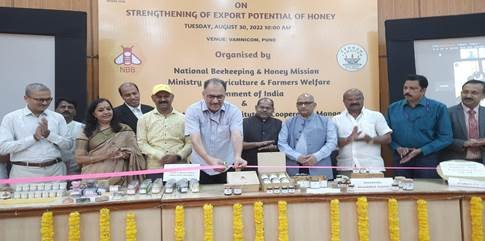Global Apiculture Market grows $10.3 billion in 2022
Worldwide demand for apiculture products estimated to increase at a CAGR of 4 per cent through 2032
According to a recently published industry report by Fact.MR, the value of the global apiculture market is $ 10.3 billion in 2022 and the same is projected to reach $ 15.3 billion by 2032-end. Worldwide demand for apiculture products is estimated to increase at a CAGR of 4 per cent through 2032.
Bee venom, royal jelly, propolis, bee bread, honeydew, beeswax, and honey are some key ingredients that are available in the market that are widely used in the pharmaceutical and cosmetics sectors. Further, honey is also used as a carrier in Ayurveda and helps prevent colds, coughs, etc., and acts as a laxative. Honey is used as a treatment for acne cure, to reduce weight and anxiety, to improve digestion, and others. The product is also utilized as a sweetener in different organic products. Further, pollen is an effective source of proteins and vitamins.
Propolis consists of natural antibiotics that are used commonly to make anti-ageing and cosmetic products. Elders use royal jelly as a nutrition-rich diet. Furthermore, venom is applied to cure the sting of bees and serve effectively against AIDS.
In recent years, there has been a noticeable increase in the demand for honey-based products and honey due to shifting consumer preference towards Ayurveda products. A noticeable increase in the demand for chemical-free, natural, and organic products further drives growth opportunities in the apiculture market.
There are various products that are available around the world because of their wider application range. These are useful in different end-use industries such as manufacturing, pharmaceuticals, polishing, food and beverages, cosmetics, etc.
Bees, propolis, royal jelly, venom, wax, honey but pollen, queens, and their larvae are some useful bee products that are available in the apiculture (beekeeping) industry. Honey can serve as the best cure for a lot of body and health problems; for instance, blood sugar, ulcers, heel burns, cough, etc. Owing to probiotic and anti-bacterial properties, honey is being used at an increased rate to make different soaps, medicines, cosmetic products, etc.
Bee venom is basically an indispensable ingredient that is used generally to cure the sting of the bee. Further, it is also used for the treatment of various problems such as rheumatism and arthritis. Honey is helpful for the reduction of indigestion and acidity, and for glowing skin. Honey is further used to boost immunity and lower the risk of heart disease.
Thus, with the growing use of these products across the medical industry, the expansion opportunities in global apiculture are likely to increase over the coming years.
Worldwide demand for apiculture products estimated to


